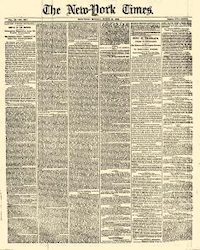The New York Times, June 11, 1860
The Democratic cauldron is beginning to boil again. The time for another attempt at nominating a Presidential candidate is close at hand. The Southern veins of the party meets this week at Richmond,—the Northern wing next week at Baltimore. The Richmond convocation will be merely preliminary. It will do nothing of any consequence, but will await the action of the Baltimoreans Possibly it may pass some resolutions,—declare the unalterable determination of the Southern Democrats never to surrender the ground they took at Charleston, and make a tender of renewed harmony on these conditions. But they will make no nominations, and take no decisive action in advance of the other Convention.
The Douglas men are mustering all their forces for Baltimore. They are determined to make him the candidate, by a two-thirds vote if they can get it, and by a majority vote if they can do no better. They have been busy since the adjournment at Charleston in electing Douglas delegates from southern States, to take the places of the seceders, whom they are determined to exclude. In this way they hope to secure a two-thirds vote, and they stand a fair chance of succeeding. The fact is, the nomination of DOUGLAS has become a matter of necessity to his friends in the Northern and Western States. They have pushed the war upon his opponents to such an extent that his defeat involves their complete destruction. Besides this, it is undoubtedly true that, with any other candidate, the party would have the greatest possible difficulty in maintaining its organization in most of the Northern States. If he were the regular candidate of the whole party, supported by the Southern as well as by Northern Democrats, he would stand a very good chance of carrying several of the most important of the Free States. He is the only Democrat who has any positive personal strength at the North;—and he owes that strength to the fact that he is openly and defiantly at war with the Administration upon its Lecompton policy, and with the Southern Democrats on their peremptory demand for Congressional protection for slave property in the Territories. Virtually, there is no difference of opinion at the North upon these points. Men of all parties agree in hostility to both positions. They may, or may not agree, upon the abstract right of Congress to legislate concerning Slavery, or upon the doctrine of Squatter Sovereignty: but they do agree in resisting the demand of the Pro-Slavery ultraists of the South. DOUGLAS is regarded as the man who has made the boldest protest against it, who has risked the most in resisting it: and this it is which gives him strength in the Northern States even beyond the lines of his own party.
But precisely the same thing weakens and destroys him at the South. His friends insist that when once in the field he will receive the votes of every Southern State. We doubt it. If he were the regular nominee of the party, perhaps he would; but he cannot, as the nominee of its Northern wing, put up in open defiance of the South, and on the express ground of flat hostility to the Southern claim upon the question of Slavery. It is quite common to represent the opposition to DOUGLAS and his doctrines as confined to the politicians of the South. The people, it is said, do not share it. We see no evidence of this,—nothing even to make it plausible. With the exception of special efforts made in a few localities, there is complete unanimity of sentiment on this point among the politicians, public men and newspapers of the South. We think, from the best information we can gather, that Senator BENJAMIN, in his speech, represented the general sentiment of the Southern States towards Mr. DOUGLAS when he said, that he was “a fallen star,”—that he had “lost the confidence and support of the Democratic party,” and that it was utterly impossible that this confidence should ever be restored. If Mr. DOUGLAS should be nominated at Baltimore,—especially if he should be nominated by a majority vote, we believe be would lose several of the Southern States,— enough to prevent his election.
It is natural, we are aware, to presume that the South would rather see him President than a Republican. But they are not driven to this alternative Indeed, many Democrats, South as well as North, believe that their only chance in defeating LINCOLN lies in running two candidates,—one of whom may be able to break the phalanx of Northern States that are likely to vote the Republican ticket. DOUGLAS, they think, might possibly carry enough free States to defeat LINCOLN, even if he should lose so many Slave States as to prevent his own election;—whereas, any other candidate would inevitably be beaten throughout the North and West. And, in this way, the election might be carried into the House of Representatives, where the Democrats would, at least, stand an equal chance.
We are quite prepared, therefore, to see two Democratic candidates in the field, Mr. DOUGLAS being one of them; and the result aimed at will be—not the election of either—but the defeat of LINCOLN and the transfer of the contest to the Halls of Congress. If the House elects, they are, at least, quite as likely to choose a Democrat as a Republican. If they fail, the Senate will choose a Vice-President who will be the acting President;—and as a matter of course they will choose a Democrat. The plot is a good one, but is quite likely to be spoiled by the election of LINCOLN.
